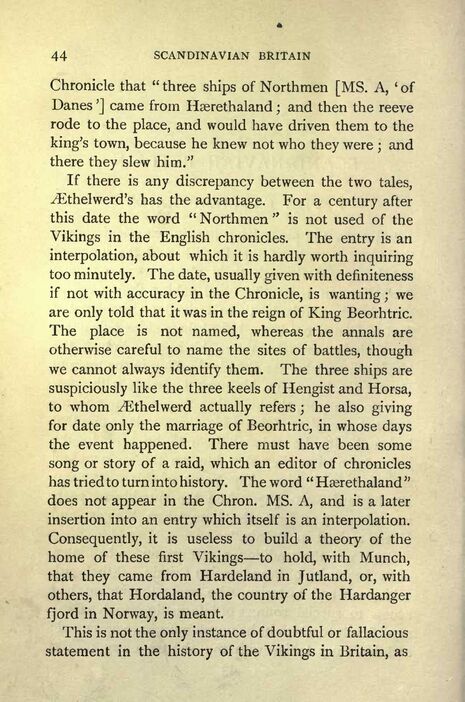
Full resolution (JPEG) - On this page / på denna sida - Scandinavian Britain - I. The Earlies Raids

<< prev. page << föreg. sida << >> nästa sida >> next page >>
Below is the raw OCR text
from the above scanned image.
Do you see an error? Proofread the page now!
Här nedan syns maskintolkade texten från faksimilbilden ovan.
Ser du något fel? Korrekturläs sidan nu!
This page has been proofread at least once.
(diff)
(history)
Denna sida har korrekturlästs minst en gång.
(skillnad)
(historik)
Chronicle that "three ships of Northmen [MS. A, ’of
Danes’] came from Hærethaland; and then the reeve
rode to the place, and would have driven them to the
king’s town, because he knew not who they were; and
there they slew him."
If there is any discrepancy between the two tales,
Æthelwerd’s has the advantage. For a century after
this date the word "Northmen" is not used of the
Vikings in the English chronicles. The entry is an
interpolation, about which it is hardly worth inquiring
too minutely. The date, usually given with definiteness
if not with accuracy in the Chronicle, is wanting; we
are only told that it was in the reign of King Beorhtric.
The place is not named, whereas the annals are
otherwise careful to name the sites of battles, though
we cannot always identify them. The three ships are
suspiciously like the three keels of Hengist and Horsa,
to whom Æthelwerd actually refers; he also giving
for date only the marriage of Beorhtric, in whose days
the event happened. There must have been some
song or story of a raid, which an editor of chronicles
has tried to turn into history. The word "Hærethaland"
does not appear in the Chron. MS. A, and is a later
insertion into an entry which itself is an interpolation.
Consequently, it is useless to build a theory of the
home of these first Vikings–to hold, with Munch,
that they came from Hardeland in Jutland, or, with
others, that Hordaland, the country of the Hardanger
fjord in Norway, is meant.
This is not the only instance of doubtful or fallacious
statement in the history of the Vikings in Britain, as
<< prev. page << föreg. sida << >> nästa sida >> next page >>